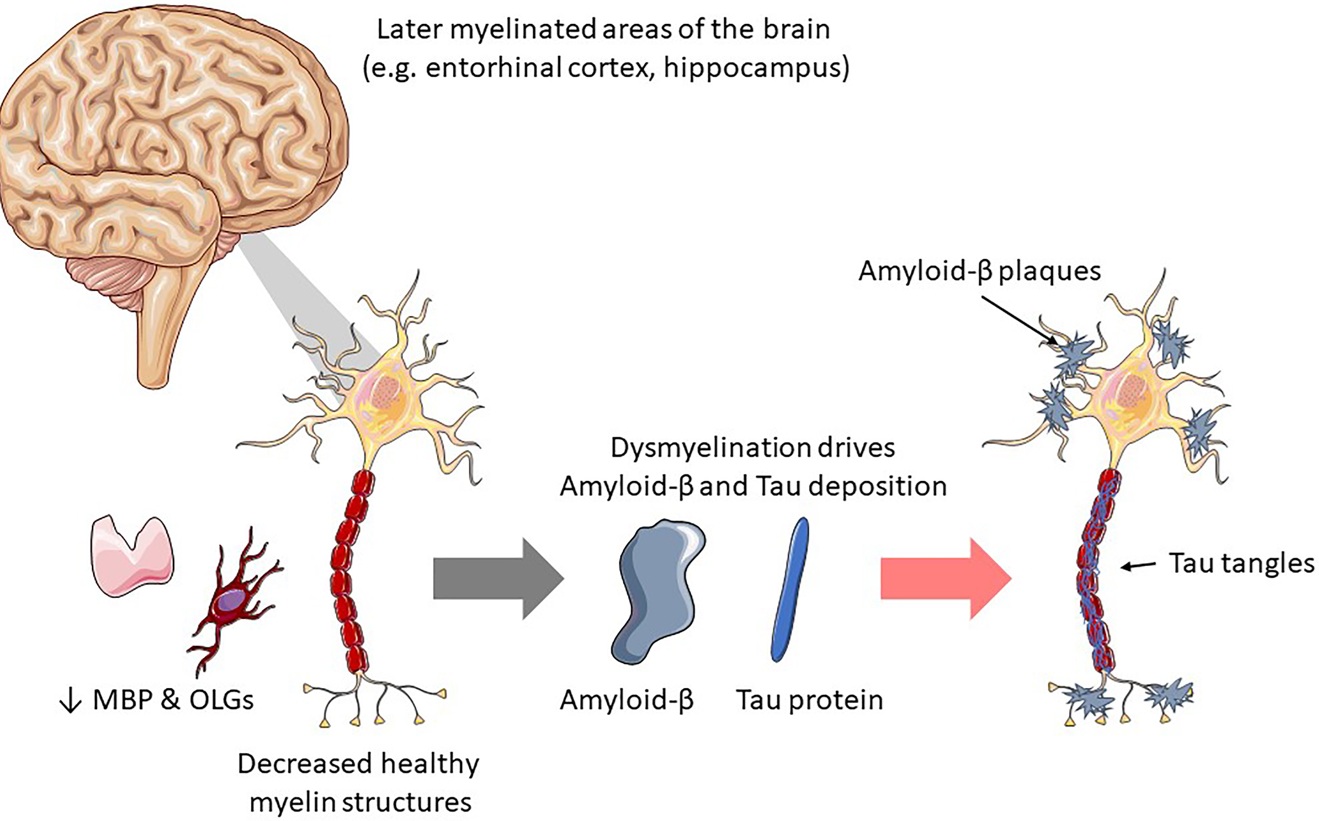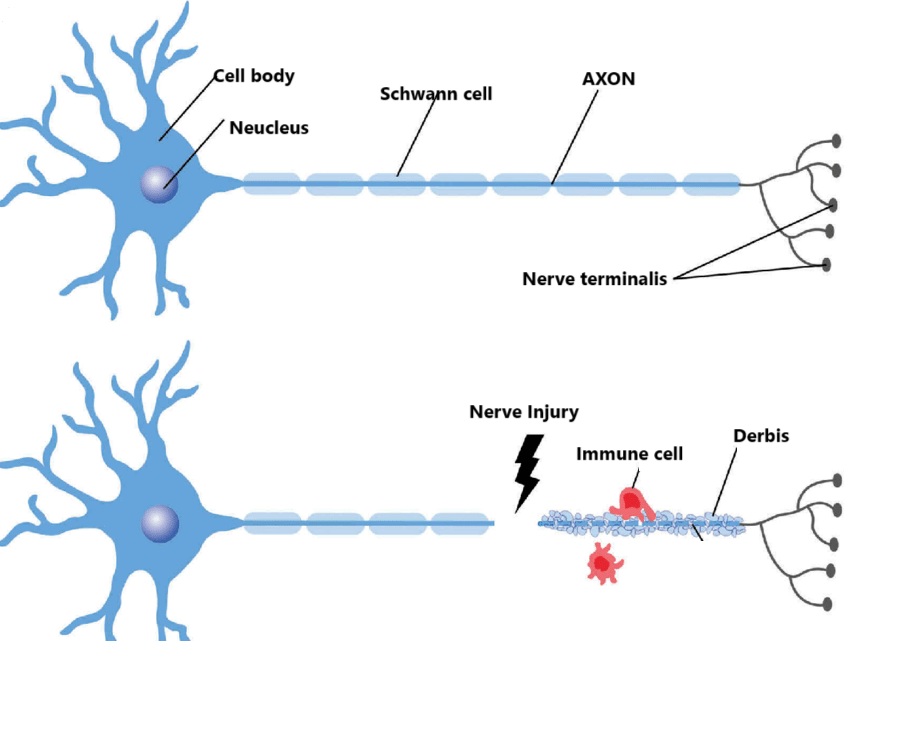Myelin
Myelin is a fatty, protein-rich insulating sheath that surrounds nerves in the brain and spinal cord. It’s essential for the transmission of electrical impulses along nerve cells, and damage to myelin can slow down these impulses.
Here are some facts about Myelin
Function
Myelin allows electrical impulses to travel quickly and efficiently along nerve cells.
Composition
Myelin is made up of cholesterol-rich membranes that extend from the plasma membrane of oligodendrocytes.
Development
Myelination begins during embryogenesis and continues after birth.
Diseases
Loss of myelin is a key component of many neurological diseases and injuries, including multiple sclerosis, stroke, and traumatic brain and spinal cord injury.
Research
Researchers are looking for ways to protect, repair, and regenerate myelin.
When myelin degrades, the nerve’s ability to conduct signals can be impaired or lost, and the nerve eventually withers. A more serious case of myelin deterioration is called Canavan disease.
A demyelinating disease affects your myelin sheath. This is a protective cover that surrounds nerve cells. Damage to your myelin can happen if your immune system mistakes healthy nerve cells for harmful ones. The most common demyelinating disease is multiple sclerosis. Treatment varies based on what type of demyelinating disease affects you. Myelin degeneration can occur as a result of aging or from demyelinating diseases.

Aging
Myelin sheaths can degenerate with age, leading to the formation of splits and balloons. These changes can disrupt the timing of neuronal circuits, which may contribute to cognitive decline. However, some myelin formation may continue during aging, as indicated by the formation of redundant myelin and thicker sheaths.
Demyelinating diseases
These diseases damage the myelin sheath, which insulates nerve cells and allows electrical impulses to travel between them. Symptoms include vision changes, tingling or numbness, fatigue, bladder or bowel problems, difficulty walking, and muscle weakness or stiffness. There is no cure for demyelinating diseases, but disease-modifying therapies can help slow their progression.
Demyelination is different from dysmyelination, which is when myelin doesn’t form normally.

Other causes of Myelin Degeneration
Other types of demyelinating disease and their causes include
- Optic neuritis — inflammation of the optic nerve in one or both eyes.
- Neuromyelitis optica spectrum disorder (NMOSD) — inflammation and demyelination of the central nervous system, especially of the optic nerve and spinal cord.
- Myelin oligodendrocyte glycoprotein antibody-associated disease (MOGAD) — inflammatory disease of the central nervous system that affects the optic nerve and spinal cord.
- Transverse myelitis — inflammation of the spinal cord.
- Acute disseminated encephalomyelitis — inflammation of the brain and spinal cord.
Symptoms of Demyelinating Diseases
- Vision loss.
- Muscle weakness.
- Muscle stiffness and spasms.
- Loss of coordination.
- Changes in feeling, also known as sensation.
- Trouble walking.
- Changes in bladder and bowel function.
Treatment of Demyelinating Diseases
There is no cure for demyelinating diseases. But disease-modifying therapies can help slow the progression of the disease in some people. Disease-modifying therapies can be used together with medicines that treat symptoms. Symptoms and how quickly the demyelinating disease gets worse varies from person to person. Getting diagnosed early and talking to a healthcare professional about treatment options is important.
The goal of treatment is to
- Minimize the effects of the attacks.
- Modify the course of the disease.
- Manage the symptoms.
A variety of therapies are recommended, depending on the disease being treated. These include medicines to improve walking, spasms, bladder dysfunction and other symptoms. Physical therapy, occupational therapy and cognitive behavioral therapy also can help manage symptoms. Talk with your healthcare professional about treatment options for your specific disease.
medlight2u.com
Acne Acne vulgaris Acute Renal Failure Adrenal cortex Angina Angina Pectoris Aortic Regurgitation (AR) Aortic Stenosis (AS) Chest pain Chronic pyelonephritis Coarctation of Aorta Cough cyanosis Cystic acne Dehydration depression Diabetes Mellitus Diagnosis of Aortic Stenosis Dr.KTS DR K TAMILSELVAN Fatigue Heart Failure Hypertension Hypokalemia Hypothyroidism Ischemic Heart Disease LBBB Mitral Incompetence Mitral insufficiency Mitral valve prolapse Nocturia Patent Ductus Arteriosus PDA Polyuria Proteinuria pulmonary hypertension Pulmonary Stenosis ST Depression Symptoms of Acne Syncope Treatment for acne valvular heart disease Ventricular Septal Defect VSD Zits


Leave a Reply